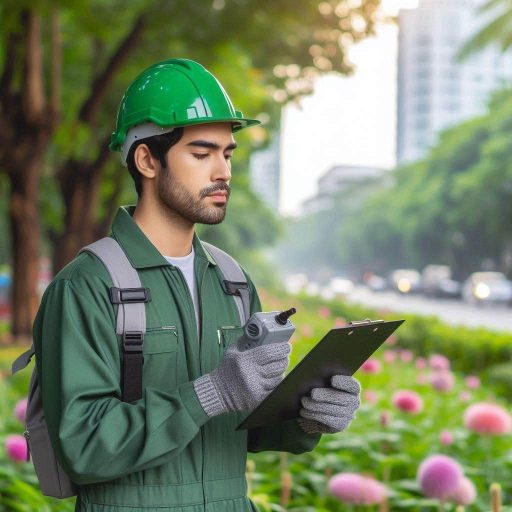Introduction
Work-life balance is the ability to effectively manage professional responsibilities and personal life.
Achieving this balance is crucial for maintaining overall well-being and job satisfaction.
It involves setting boundaries between work and personal time, allowing individuals to recharge and avoid burnout.
For environmental technicians, maintaining a strong work-life balance is particularly important.
Their roles often involve fieldwork in challenging conditions, which can be physically demanding.
Technicians may face irregular hours or extended shifts, adding pressure to their personal lives.
Balancing these demands with time for family, hobbies, and relaxation helps prevent stress and fatigue.
Effective work-life balance enables environmental technicians to stay motivated and perform their best on the job.
When technicians manage their work and personal time well, they experience increased job satisfaction and reduced burnout.
A healthy balance also promotes better physical and mental health, which is essential for tackling the demands of fieldwork and data analysis.
Organizations that support work-life balance offer flexible schedules, paid time off, and wellness programs.
These measures help technicians manage their workload and personal commitments more effectively.
By prioritizing work-life balance, environmental technicians can maintain high productivity levels while enjoying a fulfilling personal life.
This balance ultimately leads to a more sustainable career and a healthier, happier workforce.
Understand the nature of the job
Demands and Challenges Faced by Environmental Technicians
Environmental technicians encounter various demands and challenges in their roles.
They often work in diverse and sometimes hazardous environments.
Fieldwork can involve long hours, challenging weather conditions, and physically demanding tasks.
Technicians must frequently travel to different sites, which can disrupt personal routines.
The need for precise and accurate data collection adds pressure to their daily responsibilities.
They also handle emergency situations that require immediate attention, which can be unpredictable and stressful.
Balancing these demands with personal life presents a significant challenge.
Impact of Demands on Work-Life Balance
The rigorous demands of environmental technician roles can impact work-life balance significantly.
Extended field hours and frequent travel can lead to irregular work schedules.
Technicians might find it difficult to maintain consistent family time or personal activities.
The physical and mental stress associated with their work can lead to burnout.
Long periods away from home can strain relationships and impact overall well-being.
The need to respond to emergencies or urgent issues often means technicians have to sacrifice personal plans.
This imbalance can affect job satisfaction and personal happiness.
Managing the Work-Life Balance Challenge
To manage these challenges, environmental technicians must adopt effective strategies for maintaining work-life balance.
Setting clear boundaries between work and personal time is crucial.
Technicians should communicate their availability and limitations to employers and colleagues.
Prioritizing self-care and stress management techniques helps mitigate burnout.
Flexible scheduling or remote work options, when possible, can provide relief.
Taking regular breaks and time off allows technicians to recharge and maintain productivity.
Seeking support from supervisors or professional networks can also provide valuable assistance in managing work demands.
Organizational Support for Work-Life Balance
Employers play a vital role in supporting environmental technicians’ work-life balance.
Organizations should offer flexible work arrangements and promote a healthy work environment.
Providing adequate resources and training can help technicians handle job demands more effectively.
Encouraging regular feedback and addressing workload concerns can also improve work-life balance.
Organizations that prioritize employee well-being foster a more supportive and productive work culture.
By investing in these measures, employers help technicians balance their professional responsibilities with personal life.
Read: Online Courses for Surveying and Mapping Technicians
Establish boundaries
Setting clear work hours and sticking to them
Maintaining a clear boundary between work and personal life is essential for environmental technicians.
Setting specific work hours helps establish a routine and promotes consistency.
Start by defining your work hours based on your job requirements and personal preferences.
Communicate these hours clearly to your employer and colleagues.
This sets expectations and helps prevent work from spilling into your personal time.
Adhering to set work hours fosters productivity and reduces burnout.
When you consistently work within defined hours, you manage your time better.
Avoid checking work emails or taking calls outside these hours.
This practice helps you maintain a healthy balance and ensures you stay focused during work hours.
To enforce these boundaries, use tools like time-management apps or planners.
Schedule your tasks and stick to the planned work hours.
When you follow a structured schedule, you can manage workload efficiently and prevent overworking.
Importance of Scheduling Time for Personal Activities
Scheduling time for personal activities is crucial for a balanced life.
Environmental technicians often face demanding work schedules, so it is vital to allocate time for relaxation and hobbies.
Engage in activities that you enjoy, such as reading, exercising, or spending time with family.
These activities help you recharge and maintain overall well-being.
Set aside regular periods each week for personal activities.
Treat this time as non-negotiable, just like work commitments.
This approach ensures that you have dedicated moments for self-care and leisure, reducing stress and improving job satisfaction.
Incorporate relaxation techniques into your routine.
Practices like mindfulness, meditation, or simple breathing exercises can help you unwind after a busy day.
Regular relaxation helps manage stress levels and enhances mental clarity.
Balancing Work and Personal Life
Equally important is scheduling time for personal activities and relaxation.
Dedicate regular intervals each week to engage in hobbies and relaxation techniques.
These practices not only improve your quality of life but also enhance your productivity at work.
Setting clear work hours and maintaining them, coupled with scheduling time for personal activities, is key to a balanced life.
By establishing boundaries and prioritizing personal well-being, environmental technicians can manage their professional and personal lives effectively.
This balance contributes to greater job satisfaction and overall health.
Read: Surveying and Mapping Technician: Job Satisfaction
Prioritize tasks
Strategies for Effective Time Management
Effective time management is crucial for maintaining a healthy work-life balance as an environmental technician.
Managing your time well can reduce stress and increase productivity.
Start by setting clear goals and priorities for each day.
Break down larger tasks into manageable steps to make them more achievable.
Use tools like planners or digital calendars to organize your schedule.
Allocate specific time slots for different tasks and stick to them as closely as possible.
Regularly review and adjust your schedule to ensure it aligns with your priorities and workload.
Identifying High-Priority Tasks
Identifying high-priority tasks is essential for effective time management.
Begin each day by listing tasks and assessing their importance.
Focus on tasks that have the greatest impact on your goals and responsibilities.
Use methods like the Eisenhower Matrix to categorize tasks by urgency and importance.
Address high-priority tasks first to ensure critical deadlines and objectives are met.
Avoid getting sidetracked by less important tasks that do not contribute significantly to your overall goals.
Prioritizing effectively helps you use your time more efficiently and achieve better results.
Tackling High-Priority Tasks First
Tackling high-priority tasks first maximizes productivity and minimizes stress.
Start your workday by focusing on the most critical tasks.
Complete these tasks before moving on to less urgent activities.
This approach ensures that essential work is done efficiently and on time.
Breaking down large, high-priority tasks into smaller steps can make them more manageable.
Set specific milestones and deadlines for these tasks to track progress.
Addressing high-priority tasks early in the day also helps maintain momentum and keeps you motivated.
Balancing Immediate and Long-Term Goals
Effective time management involves balancing immediate tasks with long-term goals.
While focusing on urgent tasks, allocate time for planning and working on long-term projects.
Schedule regular intervals for strategic planning and goal-setting.
This balance ensures that you are addressing both immediate needs and future objectives.
Avoid letting urgent tasks overshadow important long-term goals by managing your time and priorities wisely.
Avoiding Procrastination
Procrastination can hinder effective time management and increase stress.
Combat procrastination by setting clear deadlines and breaking tasks into smaller, manageable parts.
Use techniques like the Pomodoro Technique to stay focused and maintain productivity.
Create a conducive work environment that minimizes distractions.
Hold yourself accountable by tracking progress and celebrating small achievements.
Staying proactive helps maintain a steady workflow and reduces the pressure of last-minute tasks.
Read: Importance of Accuracy in Surveying and Mapping

Communication with Colleagues and Supervisors
Importance of Open Communication about Workload and Deadlines
Effective communication is key for maintaining a healthy work-life balance as an environmental technician.
By openly discussing your workload and upcoming deadlines with your colleagues and supervisors, you can ensure that everyone is on the same page and avoid any last-minute surprises.
This transparency can help you plan your schedule more effectively and prevent unnecessary stress.
Asking for Help When Needed to Prevent Burnout
It’s important to recognize when you are feeling overwhelmed or on the brink of burnout as an environmental technician.
Don’t hesitate to ask for help from your colleagues or supervisors when needed.
Seeking assistance can help alleviate your stress levels and prevent you from becoming burnt out, allowing you to maintain a better work-life balance in the long run.
Benefits of Communicating with Colleagues and Supervisors
- Enhances team collaboration and efficiency.
- Reduces misunderstandings and conflicts.
- Creates a supportive work environment.
- Provides opportunities for growth and development.
- Improves overall work satisfaction and morale.
Best Practices for Effective Communication
- Be clear and concise in your communication.
- Listen actively to understand others’ perspectives.
- Express your concerns or needs in a respectful manner.
- Be open to receiving feedback and constructive criticism.
- Regularly check in with your colleagues and supervisors to maintain open lines of communication.
Case Study: How Effective Communication Helped an Environmental Technician
One environmental technician, named Sarah, was struggling with a heavy workload and looming deadlines.
Instead of keeping her concerns to herself, she decided to have an open conversation with her supervisor about her challenges.
As a result, her supervisor was able to redistribute some of her tasks and provide additional support, allowing Sarah to successfully meet her deadlines without feeling overwhelmed.
Through effective communication, Sarah was able to prevent burnout and maintain a healthy work-life balance.
Read: CAD Technician Salary: What to Expect in the USA
Transform Your Career Today
Unlock a personalized career strategy that drives real results. Get tailored advice and a roadmap designed just for you.
Start NowTake care of physical and mental health
Tips for Maintaining a Healthy Lifestyle Despite a Demanding Job
Balancing a demanding job with a healthy lifestyle can be challenging, especially for environmental technicians.
Their roles often involve rigorous fieldwork and irregular hours.
However, prioritizing health and wellness is essential for maintaining long-term productivity and job satisfaction.
Here are some practical tips for achieving a healthy lifestyle:
Importance of Regular Exercise
Regular exercise is vital for managing physical and mental stress.
Technicians often face physically demanding tasks, making exercise crucial for maintaining strength and endurance.
Incorporate activities like walking, jogging, or strength training into your routine.
Aim for at least 30 minutes of moderate exercise most days of the week.
Exercise improves cardiovascular health, boosts energy levels, and enhances mood, helping you stay resilient during long shifts and challenging conditions.
Healthy Eating Habits
Maintaining a balanced diet is key to sustaining energy and overall well-being.
Opt for nutrient-rich foods such as fruits, vegetables, whole grains, and lean proteins.
Avoid excessive consumption of processed foods and sugary snacks, which can lead to energy crashes.
Pack healthy meals and snacks for your workdays to avoid relying on convenience foods.
Staying hydrated by drinking plenty of water throughout the day also supports optimal physical and cognitive function.
Stress Management Techniques
Managing stress is crucial for maintaining a healthy lifestyle amidst demanding job responsibilities.
Techniques such as deep breathing exercises, meditation, and mindfulness can help reduce stress and improve focus.
Set aside time for relaxation and hobbies to unwind and recharge.
Regularly practicing stress management techniques can prevent burnout and enhance your overall well-being.
Engaging in activities you enjoy, whether it‘s reading, gardening, or spending time with loved ones, can also contribute to a healthier work-life balance.
Setting Boundaries
Establish clear boundaries between work and personal time to maintain balance.
Avoid taking work-related calls or checking emails during your personal time.
Creating a structured schedule helps you allocate time for exercise, meal preparation, and relaxation.
Communicate your needs with your employer and seek support if necessary.
A well-defined boundary between work and personal life ensures that you have time to rest and recuperate.
Prioritizing Sleep
Adequate sleep is essential for physical health and cognitive function.
Aim for 7-9 hours of quality sleep each night.
Create a relaxing bedtime routine to improve sleep quality, and maintain a consistent sleep schedule.
Proper rest supports recovery from physical exertion and enhances mental alertness, helping you perform better at work and manage stress more effectively.
By integrating regular exercise, healthy eating, stress management techniques, and adequate sleep into your routine, you can maintain a healthy lifestyle even with a demanding job.
Prioritizing these aspects of well-being helps environmental technicians remain productive, focused, and resilient, leading to a more fulfilling career and life.
Explore Further: Aerospace Engineering Software You Need to Know
Utilize technology
Technology plays a crucial role in enhancing the work-life balance of environmental technicians.
By leveraging various tools and apps, technicians can streamline tasks, improve efficiency, and better organize their work responsibilities.
Here are some recommendations for helpful apps and tools that can contribute to a more balanced work-life for environmental technicians:
How technology can help streamline tasks and improve efficiency
- Use project management software to track tasks and deadlines efficiently.
- Implement cloud storage solutions for easy access to files from anywhere.
- Use communication tools like Slack or Microsoft Teams for seamless collaboration.
- Automate repetitive tasks using tools like Zapier or IFTTT.
- Utilize mobile apps for on-the-go access to important information and updates.
- Implement time-tracking tools to monitor and optimize workflow.
Recommendations for helpful apps or tools for organization and productivity
- Evernote: A versatile note-taking app for keeping track of ideas, tasks, and projects.
- Trello: An intuitive project management tool for organizing tasks in a visual way.
- Google Calendar: A reliable tool for scheduling meetings, deadlines, and personal events.
- Todoist: A powerful task management app for creating to-do lists and setting reminders.
- Forest: An app that helps you stay focused and limit distractions by planting virtual trees.
- Rescue Time: A time-tracking tool that shows how you spend time on various activities.
By incorporating these technological solutions into their daily routine, environmental technicians can effectively manage their workload, prioritize tasks, and achieve a better work-life balance.
Embracing technology not only enhances productivity but also allows technicians to allocate time for personal pursuits and maintain a healthier lifestyle.
Plan regular breaks and vacations
The Importance of Taking Time Off
Taking time off is crucial for maintaining a healthy work-life balance.
Environmental technicians face demanding roles that can lead to burnout.
Regular breaks and vacations help recharge your mental and physical health.
Avoiding burnout ensures you remain effective and engaged in your work.
Time off prevents stress and enhances overall job satisfaction.
Prioritizing rest helps sustain long-term career success and personal well-bein
Planning Your Time Off
Effective planning is key to enjoying your vacation without work-related distractions.
Start by scheduling your time off well in advance.
Coordinate with your team to ensure your responsibilities are covered.
Create a detailed handover plan that includes key tasks and deadlines.
Inform your colleagues and clients about your absence early on.
This helps in setting expectations and reduces last-minute work pressures.
Setting Boundaries
Establish clear boundaries to separate work from vacation time.
Avoid checking work emails or taking calls during your time off.
Set up an out-of-office auto-reply to manage incoming messages.
Clearly communicate your unavailability to your team and clients.
Stick to these boundaries to fully disconnect and relax.
Respecting your own limits ensures you return to work refreshed and ready.
Choosing the Right Vacation
Select a vacation destination that aligns with your needs for relaxation.
Choose locations or activities that allow you to unwind and de-stress.
Avoid destinations with limited connectivity if you need to fully disconnect.
Plan activities that you enjoy and that offer a break from daily routines.
Engaging in hobbies or exploring new environments can enhance relaxation and enjoyment.
Enjoying Your Time Off
Make the most of your vacation by immersing yourself in the experience.
Focus on activities that bring you joy and relaxation.
Spend quality time with family and friends away from work distractions.
Practice mindfulness and be present in the moment to fully enjoy your time off.
Use this break to recharge both physically and mentally.
Returning to Work
After your vacation, transition back to work smoothly.
Reconnect with your team to catch up on any updates.
Review your handover notes and address any pending tasks.
Ease back into your work routine gradually to avoid feeling overwhelmed.
Reflect on your time off and how it benefited you to maintain a balanced approach.
Conclusion
Maintaining a work-life balance is crucial for environmental technicians.
The demanding nature of the job can easily lead to burnout.
Technicians often face long hours and challenging conditions, making it essential to manage stress effectively.
Prioritizing self-care helps prevent exhaustion and maintains job satisfaction.
Establishing healthy boundaries between work and personal life is key.
Set specific work hours and avoid taking work home whenever possible.
Creating a clear separation helps you recharge and stay focused during work hours.
Take regular breaks throughout the day to reduce stress and enhance productivity.
Engage in activities that promote relaxation and well-being outside of work.
Exercise, hobbies, and social interactions contribute to a balanced lifestyle and improve overall health.
Finding time for these activities can prevent burnout and increase job satisfaction.
Communicate openly with supervisors about workload and job expectations.
Discussing these aspects can lead to better support and adjustments to ensure a manageable workload.
Utilize company resources such as employee assistance programs if available.
Encourage colleagues to prioritize their own work-life balance as well.
A supportive work environment contributes to overall well-being and job satisfaction.




